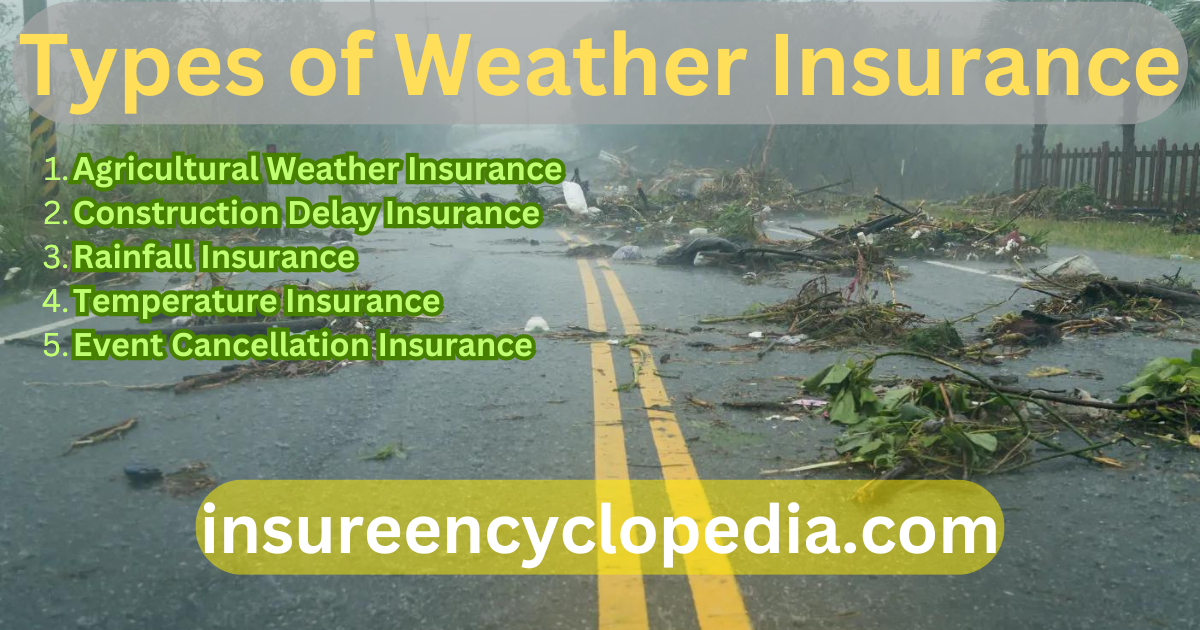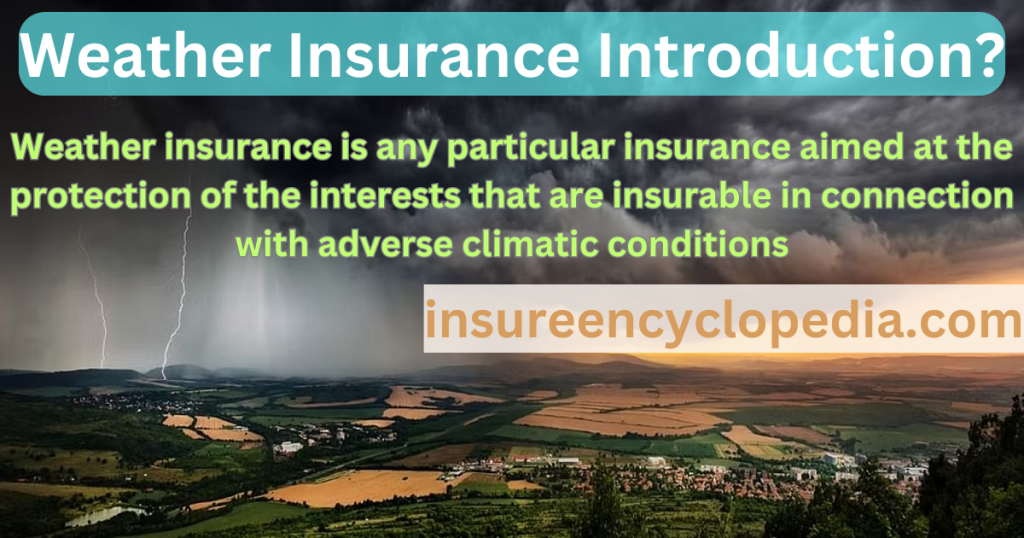Weather Insurance Introduction?
Weather Insurance is any particular insurance aimed at the protection of the interests that are insurable in connection with adverse climatic conditions. It is more appropriate for those sectors of activity, or for events that are particularly dependent on whether such as farming, outdoor leisure, building and tourist merchants. Knowledge of what is involved in weather insurance as well as how it is applied can help manage the impact of the fluctuations of weather on the finances of trade and individuals.
How Weather Insurance Works?
Policy Purchase
- Weather insurance policies are generally not standardized and are more often deal made which are designed to meet the needs of the two parties involved. The first thing that should be done when one wants to look for a weather insurance policy is to identify those weather risks that are relevant to the matter in issue. This could be as a result of changes in temperatures, rainfall, snow falls, and velocity of the winds or any other factors considered as climatological.
Determining Coverage
- It revolves round insurance for some weather circumstances such as the number of rains, the temperature which cause some circumstances, the wind speed or snows within a given period of time. The policyholder and the insurer agree on how compensation/claim will be paid, the extent of the coverage (sum insured) and for how long it will be effective.
Premium Payments
- The cost of weather insurance relates to premium and this depends with the probability of occurrence of the specific weather option, the amount incorporated in the policy, geographical area to be covered and the period of cover. Pop to mean that has been established with higher than average chance of getting into an accident thus costly insurance.

Types of Weather Insurance:
- Agricultural Weather Insurance
Covers farmers and agricultural businesses against revenues losses that may be as a result of unavoidable weather conditions such as drought, or excessive rain, frost, hail or high heat that would reduce crop yields.
- Construction Delay Insurance
Has coverages for losses of cash and cash equivalents that are related to the negative impact of weather in construction contracts. It may also be characterized by a longer period of time in order to complete the project, or more man or machinery hours on the project.
- Rainfall Insurance
Protects its bearers against the loss of money which results from either too little or too much precipitation – something that affects farming, physical activities such as sports and tourism business.
- Temperature Insurance
Offers insurance that is tied to temperature differences which affect trade. For example, an organization can hedge against a high or low period which is unfavorable to the company or for the sale of a good.
- Event Cancellation Insurance
To counter balance all form of loss whereby an event has been affected or stands to be affected either by cancellation or rescheduling due to bad weather. These are concerts; festivals; marriages among others that are normally held outside in a large compound
Benefits of Weather Insurance:
Financial Stability
- Thus, Weather insurance can be described as type of insurance which can let one cope with the loss and it is rather attractive for the income and/or revenues are determined by the weather for several businesses and individuals. This way the disruptive effects of the bad weather are averted since the aspect of finance and therefore, continuity is protected.
Risk Management
- Hence, weather insurance can be said to be rather than an important financial derivative or hedge product. On some extent is provides an opportunity to an enterprise transfer perhaps losses due to unfavorable weather conditions to the insurer while at the same time minimizing the extent of the impact in the balance of the enterprise.
Customizable Coverage
- Weather insurance has one major benefit: It does not proffer a species protection rate. They can point to certain risks, areas, dates and climate, this is presumably oriented for various branches of the economy.
Considerations When Purchasing Weather Insurance:
Assessing Risk Exposure:
- But if a person really wants to have the right decision in opting for the so-called weather insurance, then such individual must know what types or kinds of weather risks are foreseen to harm a particular business or an event. Comprehension of such risks is therefore essential so as to be in a position to capture the right cover.
Choosing the Right Coverage:
- Regarding the coverage it should be enough and if not – you can easily find additional information on the Internet. For instance, an event planner will only highly value a raining time coverage at any cost than a farmer who will highly value coverage during a drought season. The attainment of these objectives is only possible when the policy is passed through an experienced insurance company.
Conclusions of Weather Insurance:
Weather Risk insurance is another very useful tool for those persons and organizations for which losses are due to adverse climatic conditions. Because of the methods of specific solutions for definite meteorological events like rain, heat, cold, storm etc. services if offer a risk carrying contract which is a guarantee of stability and business continuity and hence cost coverage.
In this manner there is always a continuation of doing business by insurers without a possibility of facing threats of cash loss almost all the time while at the same time there are minimized losses which are attributed to such negative impact of climate factors as for example loss of dry weather in an effort to prevent an outdoor event from being called off.
The peculiarities of weather insurance described above enable the latter to be purchased by virtually any enterprise, from farming and stock raising to construction and retailing. It includes sustainable insurance to facilitate a faster and a less rigorous process of reclaim in reimbursement time that owing to unfavorable climate conditions, trade and business gets hampered. This is usually so mostly in the contemporary world where we find high levels of weather risk that make weather insurance as a useful addition to the panel of insurance.


